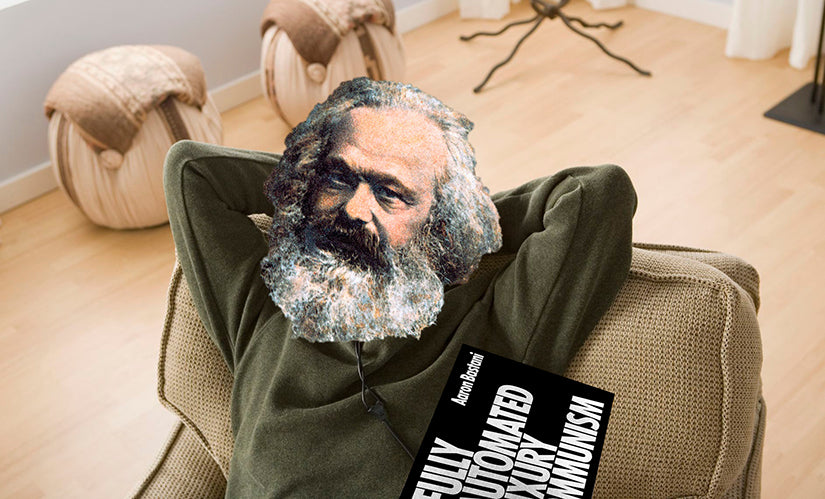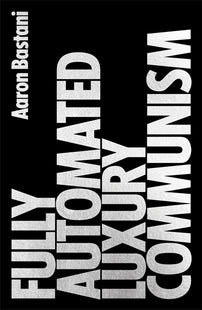Marx was a Fully Automated Luxury Communist
Fully Automated Luxury Communism began with Karl Marx. Now, over 150 years later, an opulent post-work society is more possible than ever before.

An excerpt from Fully Automated Luxury Communism by Aaron Bastani, now out in paperback and 30% off.
However people respond to the word ‘communism’, the word is associated with one person in particular – Karl Marx. It was he who claimed to see the contours of a new world at the precise moment industrial capitalism burned at its brightest.
That is not to say Marx was unique in thinking capitalism would end, nor that it would transition to something else. Indeed in this respect he was joined by, among others, two thinkers of the twentieth century, John Maynard Keynes and Peter Drucker, who despite being critics of his held similar views on how capitalism might lead to a system beyond it. By placing Marx alongside both thinkers, examining how each viewed the relationship of scarcity to capitalism and utopia, we can begin to create a clearer picture of what he meant by communism.
An aspect of Marx’s thinking which remains underemphasised is how he recognised capitalism’s tendency to progressively replace labour – animal and human, physical and cognitive – with machines. In a system replete with contradictions, it was this one in particular which rendered it a force of potential liberation. This is most clearly laid out in the ‘Fragment on Machines’, a short but important excerpt within the much larger Grundrisse. The reason you’ve likely never heard of either before, unlike the better-known Communist Manifesto or Capital, is that the Grundrisse was unpublished in German until 1939. Worse still, the text wasn’t translated into English until 1973. As a result, its prescient observations exerted little influence over communist projects in the twentieth century.
That was a tragedy, because within the Grundrisse we not only encounter the first analysis of technological evolution under capitalism, but also the opportunities that creates. As Marx so memorably put it in the ‘Fragment’,
Capital employs machinery, rather, only to the extent that it enables the worker to work a larger part of his time for capital, to relate to a larger part of his time as time which does not belong to him, to work longer for another. Through this process, the amount of labour necessary for the production of a given object is indeed reduced to a minimum, but only in order to realise a maximum of labour in the maximum number of such objects. The first aspect is important, because capital here – quite unintentionally – reduces human labour … to a minimum. This will redound to the benefit of emancipated labour, and is the condition of its emancipation.
Marx could not have been any clearer: competition compels capitalists to innovate in production. This leads to permanent experimentation with workflows and technologies, all in the pursuit of ever-greater efficiency. The logic of market demand means capitalists must produce goods and services as cheaply as they can, forcing them to constantly reduce overheads, in turn creating a never-ending cycle of automation, encompassing tasks and even whole jobs – substituting workers with machines. While generating huge amounts of suffering and exploitation under capitalism, under another system this represented a momentous opportunity.
In 1987 the US National Academy of Sciences published a report titled Technology and Unemployment. In it, restated almost word for word, is Marx’s criticism of technological change under capitalism, the key difference being the report’s authors consider such change to be wholly positive:
Historically and, we believe, for the foreseeable future, reductions in labour requirements per unit of output resulting from new process technologies have been and will be outweighed by the beneficial employment effects of the expansion in total output that generally occurs.
So while production becomes ever more efficient, and leisure is valued as a social good, increased productivity doesn’t lead to more free time but simply the production of more goods and services. In fairness to those defending it, such a view was not only founded on economic orthodoxy but also two centuries of observable change under capitalism. The difference with Marx in the Grundrisse is he thought there was an alternative, and that only in pursuing it could humans achieve freedom.
While the average political commentator likes to cast Marx as an idealistic dreamer, the man himself repeatedly stated his distaste for describing what communism might actually look like – what he termed writing ‘recipes for the cook-shops of the future’. While admirable in its humility, that is also irritating because one of the greatest minds to describe the shortcomings of the emerging system was well placed to at least suggest what might replace it. Marx’s view, however, was that workers in struggle were uniquely positioned to arrive at concrete solutions.
He was certain about some features of the new society, however. One was that the arrival of communism would herald the end of any distinction between labour and leisure. More fundamentally, it would signal humanity’s exit from what he called the ‘realm of necessity’ and entrance into the ‘realm of freedom’.
But what did that mean? For Marx the realm of necessity was where we ‘wrestle with nature to satisfy our wants and to maintain and reproduce life’ – in other words it was a world defined by scarcity, something which had confronted us since the time of our hominid ancestors. In Marx’s day it formed the central question of classical political economy: how do you efficiently and equitably allocate resources in a world where they are limited?
For Marx the realm of necessity was so far-reaching that it even included socialism. That was because, like capitalism, it had features such as work and scarcity – although as a system subject to democratic control these were rationalised and more socially just. While certainly preferable to capitalism, and something to be actively struggled for, socialism for Marx was a stepping stone to something else: communism and the realm of freedom.
This, by contrast, was marked not only by an absence of economic conflict and work but by a spontaneous abundance similar to the Golden Age of Hesiod or Telecleides, or the biblical Eden. Unlike in classical Greek poetry or religious scripture, however, for Marx this was a project to be aimed at rather than a legendary past to be revered. A realm of plenty beyond imagination wasn’t something to recall or enjoy in the afterlife – it was a political project to aim for in the here and now. It was communism.
Despite the claim that Marx favoured violent revolution, the truth is he never believed the transition beyond capitalism would be an exclusively political process – something so simple to achieve as to merely require replacing one group of rulers with another. It certainly entailed class struggle and the working class gaining political power, but it also needed new ideas, technologies and social relations. Marx considered the working class to be the key to a future society, but only because its revolution was uniquely able to eliminate work and thereby end all class distinctions.
Thus despite repeated calls for the working class to liberate itself, Marx did not believe that work makes us free – nor that the society of work expands the scope of human possibility. To the contrary, his view was that communism was only possible when our labour – how we mix our cognitive and physical efforts with the world – becomes a route to self-development rather than a means of survival. Marx viewed this as contingent on technological change: the more developed the forces of production, the greater their capacity to offer a new kind of society where labour and leisure would blend into one:
In a higher phase of communist society, after the enslaving subordination of the individual to the division of labour, and therewith also the antithesis between mental and physical labour, has vanished; after labour has become not only a means of life but life’s prime want … and all the springs of co-operative wealth flow more abundantly – only then can the narrow horizon of bourgeois right be crossed in its entirety and society inscribe on its banners: From each according to his ability, to each according to his needs!
With the arrival of communism any distinction between mental and physical labour would vanish, with work becoming more akin to play. This also meant a society with greater collective wealth, where all essential wants as well as creative desires are satisfied. Which is where luxury comes in. The concept, under conditions of scarcity, expresses that which is beyond utility, its essence an excess beyond the necessary. So as information, labour, energy and resources become permanently cheaper – and work and the limits of the old world are left behind – it turns out we don’t just satisfy all of our needs, but dissolve any boundary between the useful and the beautiful. Communism is luxurious – or it isn’t communism.
In Fully Automated Luxury Communism, Aaron Bastani conjures a vision of extraordinary hope, showing how we move to energy abundance, feed a world of 9 billion, overcome work, transcend the limits of biology, and establish meaningful freedom for everyone. Rather than a final destination, such a society merely heralds the real beginning of history.

